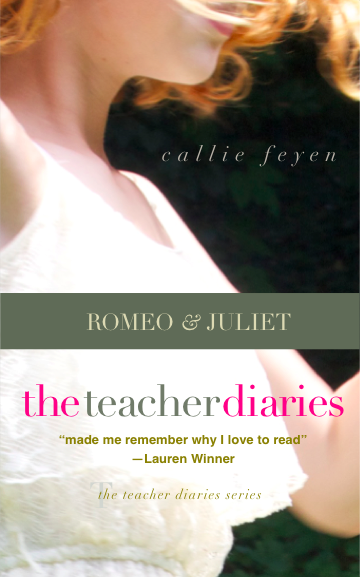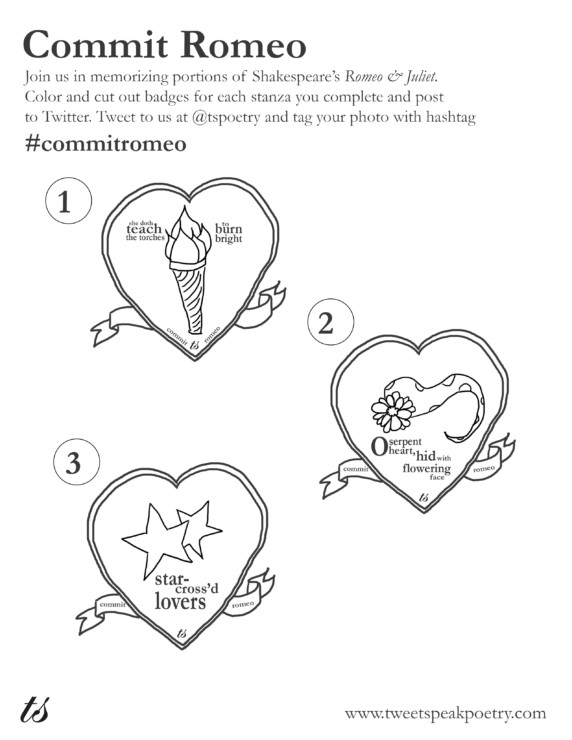Here we go again. I swear—I can’t seem to resist a good dare, especially during National Poetry Month and Tweetspeak’s “Year of Shakespeare.” This time, it’s to memorize three sections of Romeo and Juliet. Why these particular three sections? Why not ones I’m already familiar with like these from Act II?
“But, soft! what light through yonder window breaks?
It is the east, and Juliet is the sun!”
or
O Romeo, Romeo! wherefore art thou Romeo?
Deny thy father and refuse thy name;
Or, if thou wilt not, be but sworn my love,
And I’ll no longer be a Capulet.
or
“What’s in a name? that which we call a rose
By any other name would smell as sweet . . . “
Those lines are all I remember from this star-crossed lovers’ teenage tragedy. But as usual, Tweetspeak has their reasons—for them to know and me to figure out.
The sections were sent to me in the below order. If I’d actually located them in the play or even noticed the lines before I began, I would have committed the chorus first, because—hello?—Prologue. But I started with Romeo’s words from Act I, Scene V, and I really don’t think that will earn me any dermerits—or debadges. The more times I recited the words, the more sense the whole section made. I think that’s a perk of memorizing poetry.
Guess what? The challenge (ummm…dare) is for all of us. Join me this month and tuck a little Shakespearean love in your heart? I dare you. Grab our fun #CommitRomeo badges to celebrate your progress on Twitter and Instagram.
ROMEO
O, she doth teach the torches to burn bright!
It seems she hangs upon the cheek of night
Like a rich jewel in an Ethiope’s ear;
Beauty too rich for use, for earth too dear!
So shows a snowy dove trooping with crows,
As yonder lady o’er her fellows shows.
The measure done, I’ll watch her place of stand,
And, touching hers, make blessed my rude hand.
Did my heart love till now? forswear it, sight!
For I ne’er saw true beauty till this night.
and
JULIET
O serpent heart, hid with a flowering face!
Did ever dragon keep so fair a cave?
Beautiful tyrant! fiend angelical!
Dove-feather’d raven! wolvish-ravening lamb!
Despised substance of divinest show!
Just opposite to what thou justly seem’st,
A damned saint, an honourable villain!
O nature, what hadst thou to do in hell,
When thou didst bower the spirit of a fiend
In moral paradise of such sweet flesh?
Was ever book containing such vile matter
So fairly bound? O that deceit should dwell
In such a gorgeous palace!
and
CHORUS
Two households, both alike in dignity,
In fair Verona, where we lay our scene,
From ancient grudge break to new mutiny,
Where civil blood makes civil hands unclean.
From forth the fatal loins of these two foes
A pair of star-cross’d lovers take their life;
Whose misadventured piteous overthrows
Do with their death bury their parents’ strife.
The fearful passage of their death-mark’d love,
And the continuance of their parents’ rage,
Which, but their children’s end, nought could remove,
Is now the two hours’ traffic of our stage;
The which if you with patient ears attend,
What here shall miss, our toil shall strive to mend.
Download Printable Commit Romeo Badges
Photo by Joel Olives, Creative Commons license via Flickr. Post by Sandra Heska King.

—Gregory Wolfe, Editor, Image
Get a Free Sample of The Teacher Diaries Now
- 50 States of Generosity: Rhode Island - June 2, 2025
- 50 States of Generosity: Iowa - April 7, 2025
- 50 States of Generosity: Montana - January 27, 2025


Sandra Heska King says
Oh, LW. The serpent with the flowering face! That has to be one of the best badges yet! (That stanza’s a tongue-twister.)
Will Willingham says
These were a little tricky–the lines didn’t include a lot of images that seemed ideal for the badges. Was discussing with someone else today that, at least with his plays (as opposed to his poems), Shakespeare seemed to be more a master of words than images. 🙂
The video is a delight. Love the way you continue to commit. 🙂
Sandra Heska King says
Thanks, LW. I wonder sometimes if everything will get jumbled up into one poem eventually. I can still do Prufrock, though… at least get a good way into it.
Katie says
Sandra,
Loved this:
“. . ., and I really don’t think that will earn me any demerits or debadges.[ 😉 ] The more times I recited the words, the more sense the whole section made.”
You always make me smile.
Keep committing poetry and sharing your videos!
Gratefully,
Katie
Sandra Heska King says
Thanks so much, Katie. And it’s true. When I read a poem, I tend to often skim through it and move on to the next. Memorizing makes me slow down and chew the words. And then they begin to make sense. 🙂
Donna Falcone says
Brava! Sandra, I love listening to your recitation, and watching your expression as you go along – I can see you watching the story unfold in your mind’s eye ….
Sandra Heska King says
Aww, thanks, Donna. That Shakespeare could bring humor even to tragedy.
Donna Falcone says
I’m wondering… do you put yourself in the scene to help you remember?
Sandra Heska King says
Good question. Partially, yes. 🙂
I also can kind of see the words on the page I’m memorizing from.
Some people have great success building memory palaces. That works for me for lists but not so much for a piece of poetry. I prefer to sink into the images and rhythm. I think it helps me understand a little better where to me a memory palace seems more rote. But they work for others. I think once the words are sealed in the mind in whatever way, one can then live with the piece.
https://artofmemory.com/wiki/How_to_Build_a_Memory_Palace
Donna says
That’s amazing that you can ‘see’ the words on the page that way. Is that a type of what they call ‘photographic memory’? I think it’s so interesting the different tools people use to remember.
Sandra Heska King says
I don’t think so. I think it’s just a matter of having lived with that particular page for so long. I have to do more research on it, but some deny there is such a thing as a photographic memory–which I think of as see it once and boom you’ve got it. There’s something called an “eidetic memory,” where someone can see an image and then hold it for several (?) minutes.
Donna says
My aunt was said to have a photographic memory- she could read a book almost as fast as she could steadily turn the pages. Maybe eidetic… IDK, but I know she could read and retain, in one sitting, a book that would take me weeks to read. Blew my mind.
Sandra Heska King says
Amazing. Did that come naturally, I wonder? Evelyn Wood? My husband took one or more of her courses and can whiz through a novel faster than I can. And I just saw she has a memory dynamics program. Maybe I should look into that. 🙂
Donna Falcone says
I think naturally, although I can’t say for sure. The memory dynamics sounds interesting.
Bethany R. says
How fun, Sandra! Loved read these:
“Like a rich jewel in an Ethiope’s ear;
Beauty too rich for use, for earth too dear!”
and
“debadges”
Sandra Heska King says
Hi, Bethany. I liked those two lines, too. I had trouble making the dove troop with crows–I kept wanting them to be owls. I don’t know why. I had to keep reminding myself it needed to rhyme with “shows.” 😉